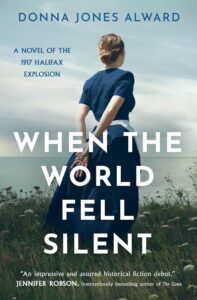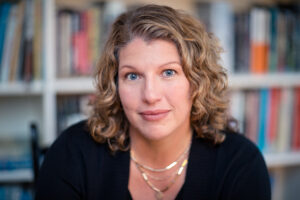Launch: Donna Jones Alward’s When the World Fell Silent
INTERVIEW BY ANNE EASTER SMITH
Donna Jones Alward worked as an administrative assistant, teaching assistant, in retail and as a stay-at-home-mom, but always knew her degree in English Literature would pay off, as she is now happy to be a full-time writer. Her new historical fiction tales blend her love of history with characters who step beyond their biggest fears to claim the lives they desire. Donna currently lives in Nova Scotia, Canada, with her husband and two cats. You can often find her near the water, either kayaking on the lake or walking the sandy beaches to refill her creative well.
How would you describe your book?
When the World Fell Silent tells the story of two women – one a Bluebird Nurse, the other a war widow—who face unspeakable loss during the Halifax Explosion of 1917. It’s a story of tragedy, resilience, and reconciling old lives with new amidst the theme of the importance of family and what that truly means.
 The historic explosion is the catalyst in your story, but was that the impetus for writing about two Nova Scotian women in the WWI era?
The historic explosion is the catalyst in your story, but was that the impetus for writing about two Nova Scotian women in the WWI era?
I would say it was the explosion. The event provided a background to drive the plot forward. It was the “hook,” yes, but hopefully only in the background. I have it happen early in the book, so I can use it to change the trajectory of my two protagonists’ lives.
The book’s themes seem to be grief, motherhood, women’s lot in life, wartime privations and courage. Do you agree?
I would agree. Not all were intentionally done, but I did deliberately look at a woman’s lot in life. There’s a line where one of my protagonists, Nora, says she’s not conventional; she’s as “independent’ as she could have been in 1917. Charlotte is far more domestic—a homemaker—but is adrift after being widowed. But the big theme of the book is that family is everything. It asks the question if family is everything, how do you deal when the fabric of family is torn apart by war and tragedy.
Let’s talk about the explosion and what it did to Halifax on one horrific day. In all the tragic events of WWI, why was two ships exploding a bay in a non-combat zone so historically devastating?
The port of Halifax is a deep water port that doesn’t freeze in the winter. It narrows and then drains into the Bedford Basin, which was perfect for ships waiting to form a convoy. This was crucial to Eastern Seaboard military shipping departures to Europe (both US and Canadian). The Mont Blanc was coming up from the US filled with highly incendiary munitions, and very few people knew of its cargo. It arrived after the submarine net had gone across the Narrows for the night, and had to wait outside it. The other ship was supposed to leave earlier in the day but it had been waiting for coal and sailed late. If everything had run on time this collision wouldn’t have happened. The explosion leveled the entire north end of the city, wiping out docks, ships, warehouses and factories along the shore, killing nearly 2,000. The number of lives lost wasn’t greater because of the influx of soldiers, but the population of Halifax had swelled because of the soldiers and the enterprise that followed them.
Other than the obvious wartime experiences, do any of either Nora’s or Charlotte’s correlate to your own life or any of your relatives?
Yes. I used my postpartum depression experience in writing of Charlotte’s response to her trauma. We call it PTSD today, but I needed to try and write about how people dealt with it back then. In that way, Charlotte is a bit of an unreliable narrator.
Tell us about the choice of using two first-person POVs. Is this something you have done before?
This is the first time! I read a lot of 1st person, but I’ve always been a 3rd-person writer. This is my first historical fiction, and in my original draft, I had Charlotte as 1st person and Nora as 3rd. My editor (who is wonderful BTW) said she was having a harder time relating to Nora, so I said how do you feel about switching her into 1st person. So I revisited writing Nora’s sections in 1st as well, and by the time I got to the second chapter I was, like, “oh yeah, this is how it is supposed to be.” I do find 1st a little limiting, but I think the distance between character and reader is less.
 What about your publishing experience. Sixty-six books is quite an achievement! You are known for your romance novels, so why the change?
What about your publishing experience. Sixty-six books is quite an achievement! You are known for your romance novels, so why the change?
This is my first hist-fic book, the first time writing in 1st person, and the longest book I have ever written at 110,000 words! But I know how to write a character-based book from my other writing, and I like to have a reader close the book and have hope. I was turning 50 and after 66 books, I wanted a change. I thought, what the heck am I waiting for! I am having so much fun with it, and I haven’t looked back. I firmly believe that there are no small connections in publishing. Charlotte Ledger (my publisher at One More Chapter), used to be an editor at Mills & Boon (UK Harlequin) and I wrote for them for many many years. OMC was looking for more Canadian content and she reached out and asked if I would write a rom-com or hist-fic. Rom-com was no-go. I think I am kind of a funny person, but I don’t think I am funny on purpose! Anyway, that was my chance. And it’s exciting HarperCollins Canada has jumped on board with it as well.
How long did it take you to write When the World Fell Silent?
I don’t know! When Charlotte messaged me, and we were to bounce ideas off each other, I had just signed a six-book contract with Harlequin. So I had commitments and was trying to squeeze research and concepts in around those. To answer your question, probably about three years from the message to sending her the first draft, but I wrote six books in that time and re-pubbed 30 of my backlist. So I was a busy girl!
Who were the writers who influenced you?
I grew up on a farm here in Canada and spent a lot of my summer vacations on our porch reading. I, of course, read all the Anne of Green Gables books. In high school, it was LaVyrle Spencer—a Minnesotan who wrote historical and contemporary romance. Getting my degree in English Lit meant I was a huge fan of Austen, Eliot and Hardy. Now I enjoy Jennifer Robson, Kate Quinn, and Canadians Genevieve Graham, Lecia Cornwall (loved That Summer in Berlin!), and Bryn Turnbull.
Read any good books lately?
The Uncharted Flight of Olivia West by Sara Ackerman and The Frozen North by Ariel Lawhon, which is in the running for my favorite book of the year.
What’s next on your agenda?
Another hist-fic that involves Nova Scotia with a working title of The Coldest Night, about the Titanic, the Carpathia, and finishes in Halifax.






